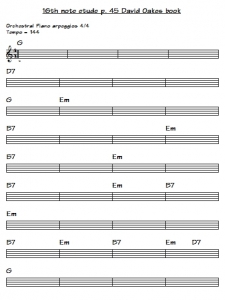The Art of Crafting Chord Charts: A Transformative Skill for Guitarists
Today, let’s dive into a valuable skill that has the power to transform your musical journey: the art of crafting chord charts. Whether you’re a seasoned player or just starting, creating chord charts can elevate your playing in numerous ways.
Effortless Recall
Imagine effortlessly recalling that captivating riff or the chord progression from your favorite song months after you first played it. Chord charts act as personalized musical blueprints, allowing you to revisit and recreate songs effortlessly. This not only enhances your repertoire but also reinforces muscle memory.
Rhythmic Mastery
Creating chord charts demands attention to detail, especially in rhythm. As you count beats and bars per chord, you’re not just deciphering the structure of a song; you’re improving your rhythmic precision. This newfound sense of timing will carry over into all aspects of your playing, making you a more dynamic and expressive guitarist.
Enhanced Song Form Understanding
Understanding the anatomy of a song is crucial for any musician. Crafting chord charts compels you to analyze and comprehend song structures. You become adept at identifying verses, choruses, bridges, and any nuanced changes in the music. This skill is a game-changer when it comes to playing with a band or simply jamming with friends.
Building a Proud Repertoire
Your repertoire defines you as a musician. Chord charts empower you to curate a repertoire you can be proud of. Instead of merely playing songs, you start building a collection that showcases your evolving taste, style, and skill. Your personal repertoire becomes a testament to your musical journey and growth.
Expanding Chord Vocabulary
Encountering unfamiliar chords can be daunting, but not when you’re armed with the ability to create chord charts.
How to Start
Creating chord charts might seem intimidating at first, but it’s a skill worth mastering. Begin with songs you love. Break them down chord by chord, paying attention to transitions and rhythm. Use symbols for strumming patterns and dynamics. Don’t worry about making it perfect – the goal is to capture the essence of the song in a way that makes sense to you.
Step-by-Step Guide to Crafting Chord Charts
- Select a Song: Start with a song you are familiar with and enjoy playing.
- Listen and Analyze: Listen to the song multiple times. Identify the chord changes, the structure (verses, chorus, bridge), and any unique elements.
- Write Down Chords: Begin writing down the chords in the order they appear. Use a simple notation that works for you.
- Include Rhythmic Notations: Add symbols or notes to indicate the strumming pattern and rhythm. This helps in maintaining the song’s feel.
- Refine Your Chart: Play through your chord chart, making adjustments as necessary. Ensure it captures the essence of the song.
Tools and Tips
- Software: Utilize music notation software like MuseScore or Guitar Pro for a more polished look.
- Templates: Use printable chord chart templates available online to get started.
- Practice: Regularly create chord charts for new songs to improve your skills.
Conclusion
In essence, writing chord charts is not just a technical skill; it’s a transformative journey that enhances every aspect of your playing. It’s about making music a personal, tangible experience. So, grab your guitar, pick a song, and start charting your musical adventure today.
Happy strumming!
—
If you want to set up a free trial lesson either in person or online, simply click here: fill out this form and we’ll get back to you within 24 hours. You’ve got nothing to lose and an amazing musical world to gain. 🙂


